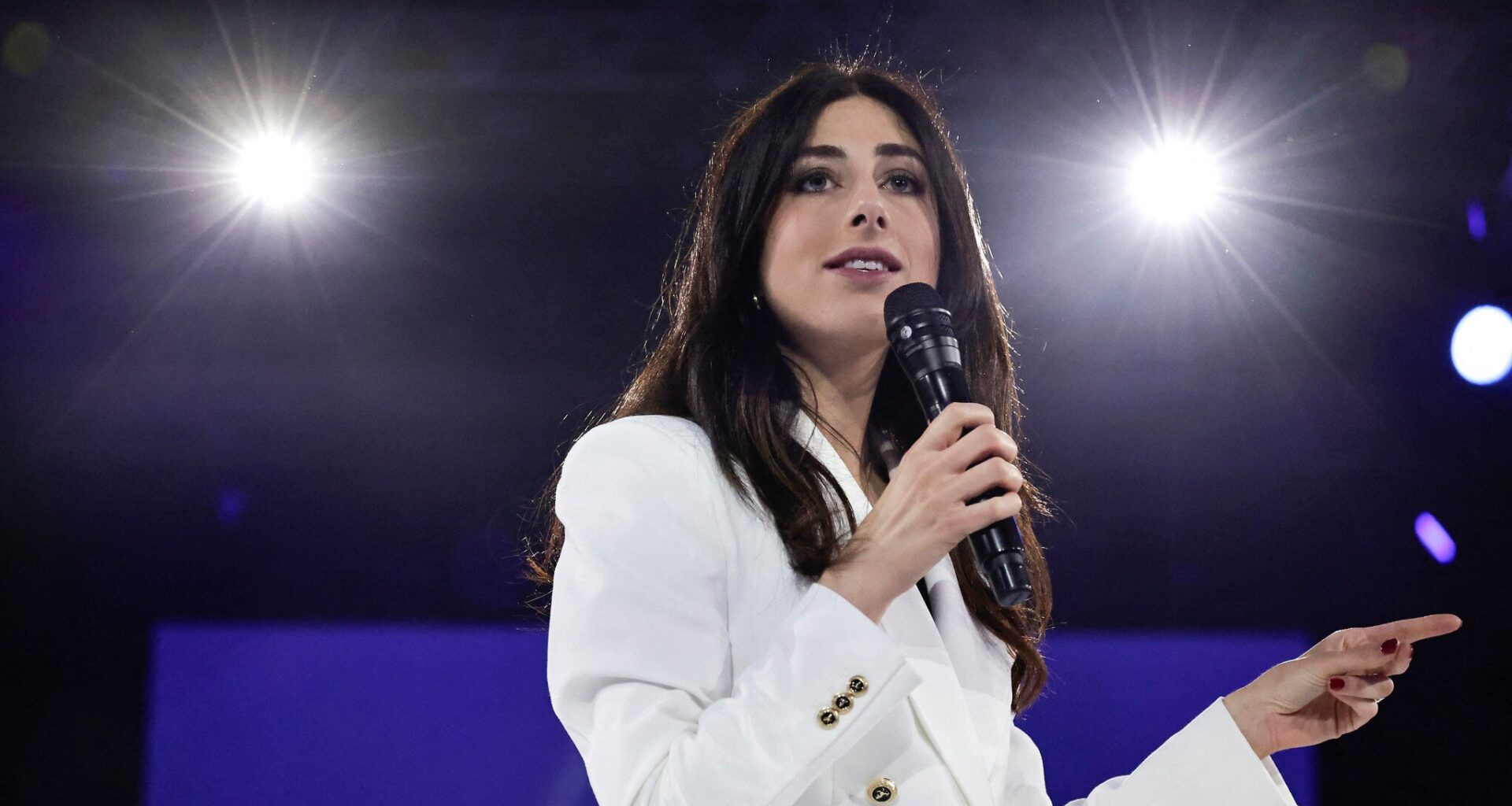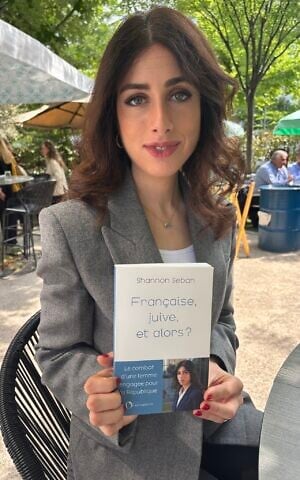PARIS — For Shannon Seban, antisemitism is anything but academic. As an outspoken young politician and a rising figure in the country’s large Jewish community, she’s experienced up close the abusive scourge that has bedeviled France for centuries. Now, with the publication of her provocative new book, “Française, juive et alors?” (“French, Jewish and So What?”), Seban is increasingly the target of anti-Jewish hate, including death threats.
“Given the current reality, I am concerned for my safety,” she told The Times of Israel during a recent interview at a café in Paris’s 15th arrondissement. “I’m aware of the risk and I’m cautious, but I don’t want to be put under police protection on a daily basis. I also don’t want to cry that I’m a victim. I’m not. This is a fight and I’m combative.”
Last summer, as a candidate in parliamentary elections, Seban unexpectedly found herself in the spotlight. Facing considerable hostility due to her Jewish identity while campaigning in a Paris suburb, including people screaming at her, “Get out of here, you filthy Zionist,” the Interior Ministry put her under special police protection, attracting French and foreign media coverage.
“It didn’t matter that I was promoting peace and spoke about eventual recognition of a Palestinian state,” Seban says. “Because I was known as Jewish, that meant for some people I was a dirty Zionist and I killed children.”
Not long after French President Emmanuel Macron announced on July 24 that France would officially recognize a Palestinian state in September, Seban voiced her opposition publicly.
‘Recognizing a Palestinian state without prior peace… is not only pointless, it’s counterproductive’
“Recognizing a Palestinian state without prior peace, without a structured political process, without guarantees for Israel’s security or a deep reform of the Palestinian Authority, is not only pointless, it’s counterproductive,” she later told The Times of Israel.
“Such a move must be the culmination of a peace process, not its starting point. It must be conditional on the release of all hostages held in Gaza, the disarmament of Hamas, a genuine reform of the Palestinian Authority and mutual recognition between both states. Anything else is diplomatic recklessness and moral surrender.”
British Prime Minister Keir Starmer, left, and French President Emmanuel Macron hold a joint press conference in London, July 10, 2025. (Leon Neal/Pool Photo via AP)
Seban, 29, who’s an avid boxer, is engaged in an intense battle on many fronts. Her book is just one of them. She often denounces antisemitism in media interviews, addresses the issue at conferences in France and abroad, and serves as European Advisor for the US-based Combat Antisemitism Movement. As a city council member in the Paris suburb of Rosny-sous-Bois, first elected in 2020, her role now includes overseeing efforts to fight discrimination and uphold “laicité,” (loosely translated as secularism), enshrined in France’s constitution, underpinning the separation between state and religion.
Seban, who sees laicité as a cornerstone of French society, cites it several times in her book, which was born of her experiences with antisemitism and her evolution from previously keeping her Jewish identity private to now proudly acknowledging it in public.
“In July 2023, I was caricaturized and humiliated by a sinister Nazi website,” her book begins. “I had the choice — let it pass or react. I chose to retaliate and to make [the incident] known.”
An extreme right-wing website had targeted Seban, showing a photo of her with antisemitic comments, including attacking her physical appearance: “Even if you want to forget for a second that she’s Jewish, her nose, in a very menacing way, won’t allow it.”
Continuing in the foreword, Seban writes: “This pathetic, cowardly, antisemitic attack persuaded me to take on the fight that I was already carrying inside of me — the struggle against prejudice, discrimination and hate. Above all, it helped me to embrace and assert my Jewish identity without hiding it. This book tells the story of my journey.”
Shannon Seban on the election trail in the Paris suburb of Val de Marne, June 2024. (Courtesy)
It also gives readers a window into the challenges facing Jews today in France, where they number around 450,000, constituting the world’s largest Jewish community outside Israel and the United States. Like their counterparts in many countries, French Jews have experienced a dramatic rise in antisemitism in recent years. According to the Representative Council of Jewish Institutions in France, the country’s main Jewish organization, there were 3,246 recorded antisemitic actions and threats in 2023 and 2024, nearly triple the number in the previous two-year period.
“Growing up, I didn’t attach much importance to my Jewish identity and largely hid it out of fear,” says Seban. “I didn’t say it out loud because my parents had always told me religion should be kept at home.”
A heartfelt cry
Speaking with great conviction, Seban switches easily between French and English. Minutes earlier, she arrived from the TV studio of CNews, irritated by what she called an antagonistic interview linked to her book.
Shannon Seban promotes her book in southwestern France, June 28, 2025. (Courtesy)
“In many ways, my book is a cri de coeur,” says Seban, using the French term which literally means “a cry from the heart,” but is often translated as an “urgent, heartfelt appeal.”
“What I wrote is also a shout of alert and a shout of love for my country,” Seban says. “I’m a proud French Jew, but I don’t want to choose between being Jewish and being French, as reflected in the title of my book.”
In “French, Jewish and So What?” written in the first-person in a clear, unpretentious style, Seban mixes the personal with salient facts about contemporary and historical France.
Born in Seine-Saint Denis, just northeast of Paris, Seban still lives in the working-class, multicultural suburb where she grew up with her two older brothers, her Moroccan-born mother and Algerian-born father. Home to many Muslim immigrants, the area has long been associated with crime, poverty and Islamism.
In last year’s election, Seban, who is head of a local chapter of Macron’s centrist Renaissance Party, finished second in the eight-person race, well behind the popular incumbent, Mathilde Panot, a senior member of the France Insoumise (France Unbowed) party. Like many French Jews, Seban considers Panot, her party and its leader, Jean-Luc Melanchon, antisemitic.
“La France Insoumise is instrumentalizing antisemitism,” says Seban. “Although they don’t know much about the Israeli-Palestinian conflict, they use it to hate Jews and to gain voters among the Muslim community. During my election campaign, I saw how they focused so much on Gaza and Palestine, and so little on education, security, health, or immigration. They’re not serving the interests of French people, but rather the interests of Hamas and fueling antisemitism.”
The topic is close to home for Seban, who becomes visibly upset while discussing the toxic hate, especially directed at Israel, where she has relatives, and which she’s visited many times, most recently earlier this summer.
‘Antisemitism has become for many people not only normalized, but even worse, fashionable’
“Antisemitism now in France has new forms it never used to have,” says Seban. “Anti-Zionism has become the most common form, and it’s not being punished. When anti-Zionism hides hate of Israel and denies its right to exist, it’s a hatred of Jews and a form of antisemitism. Especially on social media, antisemitism has become for many people not only normalized, but even worse, fashionable.”
If Seban bristles with disdain for the far-left La France Insoumise, she’s equally critical of its far-right counterpart, the Rassemblement National (National Rally). Despite its antisemitic origins and former neo-Nazi ideology, the party has rebranded itself in recent years as pro-Israel and supportive of Jews, for whom it highlights its hardline position against immigration and Islamist ideology.
Shannon Seban at the second International Dialogue of Civilization and Tolerance conference, an interfaith event in Abu Dhabi, February 2025. (Courtesy)
“The RN doesn’t stop saying they’re the best protector of the Jewish people,” says Seban. “They’ve gone from being the top hater of Jews to claiming to be our best defender. This is pure opportunism. I can’t forget about their antisemitic past and that last year they had candidates who were racist, xenophobic, anti-Jewish and anti-Muslim. A lot of Jews want to vote for them, thinking it will be good for our community, which I reject because of my political stance of fighting extremism, whether from the left or right. For me, the RN and La France Insoumise are opposite sides of the same coin.”
‘Why have Egypt, Saudi Arabia, Syria and Jordan banned the Muslim Brotherhood for being a terrorist organization, but in France we don’t act’
Seban also worries about the Muslim Brotherhood.
“In France, like elsewhere in Europe, they’re very strong,” says Seban emphatically. “Why have Egypt, Saudi Arabia, Syria and Jordan banned the Muslim Brotherhood for being a terrorist organization, but in France we don’t act, except for the government ordering a report on the threat. It’s insane because there’s a serious danger from the Muslim Brotherhood, which is infiltrating our schools, our associations, our mosques and even our social networks.”
Holding her ground
Seban paints a stark reality.
Shannon Seban holds her book, ‘Française, juive et alors?’ or ‘French, Jewish and So What?’ in Paris, June 2025. (Robert Sarner)
“The situation for French Jews is really bad,” she says, echoing her book, which she’s hoping to also publish in English.
“Antisemitism is everywhere – in the streets, in schools, restaurants, online – and it will continue to worsen, especially as long as the Israeli-Palestinian conflict persists. I’m quite pessimistic. I’m constantly hearing about yet another antisemitic incident. We’re almost getting used to it. Every day, I receive literally dozens of messages on Instagram from people asking me for advice and help with the antisemitism they’re experiencing in their lives.”
For all her dismay, Seban remains resolute. “I’m deeply committed to fighting against any type of racism and discrimination, whether it’s targeting Jews, Muslims, Christians or whoever,” she insists.
“What motivates me is working for fraternity. That’s why I’m so involved with interfaith dialogue, education about tolerance and promoting peace between religions. I believe interfaith dialogue works as long as it’s not only embodied by priests, rabbis and imams,” she says.
Unlike some Jews who in recent years have left France due to rising antisemitism, Seban says she isn’t going anywhere.
“I love my country,” Seban states in her book. “I grew up here and it’s not hate that will make me flee. It’s when there are difficulties that you need to stay.”




